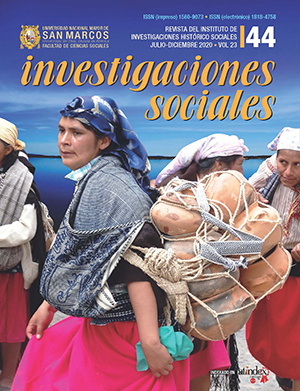Childhood and the Right to the City: A proposal to study in the poor sectors of Metropolitan Lima
DOI:
https://doi.org/10.15381/is.v0i44.19578Keywords:
Childhood, Right to the City, liberty and security policiesAbstract
This article offers an epistemiological view for the analysis of economic and sociopolitical conditions in the distribution and agency of urban spaces for children. The article presents a theoretical and practical framework to see the process of intersectionality between childhood and The Right to the City. Based on the documentation of three areas of study: 1) Legal framework for the defense of childhood in Peru. 2) The conceptualization of the right to the city. 3) The subject of law, central objective, inserted in a knot of tension between liberty policies, security and social confinement. The conclusion is that in the context of this global health and economic crisis, deepened by the pandemic, we need democratic methods of investigation, that allow proposals that qualify and relax policies of exclusion and lockdown that today harden, contravening the recognition of full citizenship of children since birth, including children’s right to participate in the community and decide on the issues that affect them.
Downloads
Published
Issue
Section
License
Copyright (c) 2021 Fabiola Teresa Vargas Valencia

This work is licensed under a Creative Commons Attribution-NonCommercial-ShareAlike 4.0 International License.
AUTHORS RETAIN THEIR RIGHTS:
a. Authors retain their trade mark rights and patent, and also on any process or procedure described in the article.
b. Authors retain their right to share, copy, distribute, perform and publicly communicate their article (eg, to place their article in an institutional repository or publish it in a book), with an acknowledgment of its initial publication in Investigaciones Sociales.
c. Authors retain theirs right to make a subsequent publication of their work, to use the article or any part thereof (eg a compilation of his papers, lecture notes, thesis, or a book), always indicating the source of publication (the originator of the work, journal, volume, number and date).













